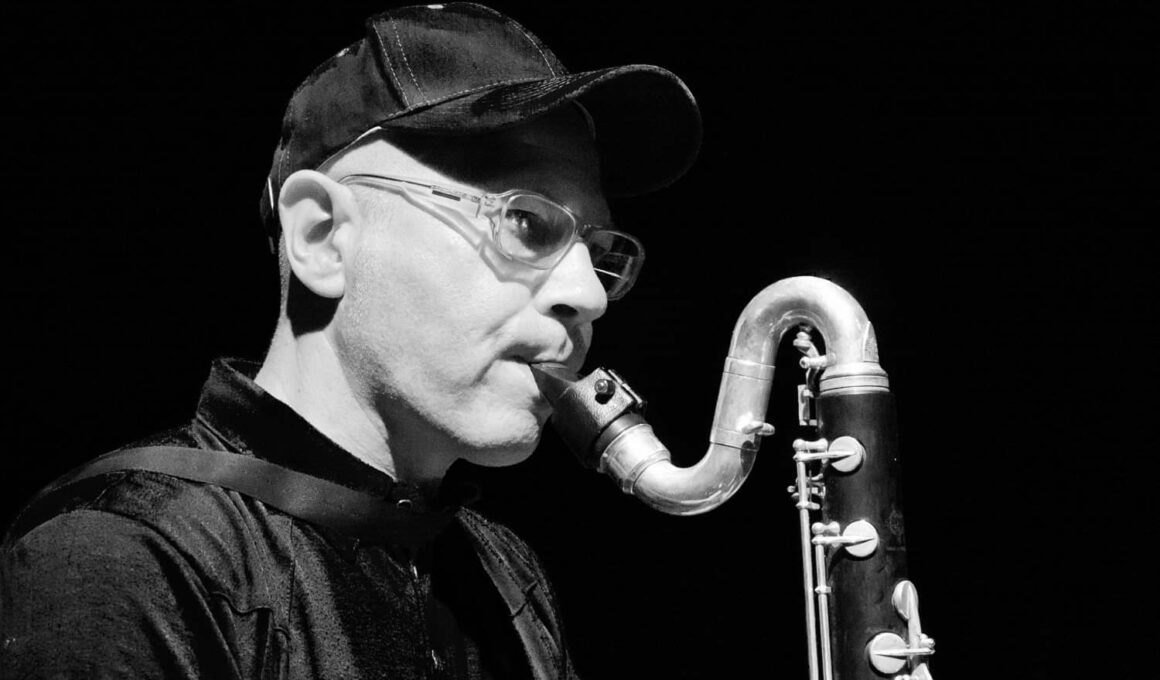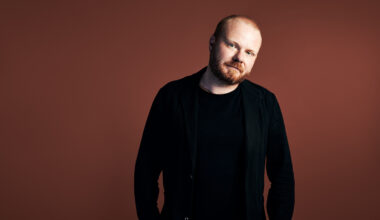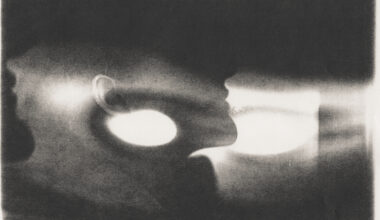Lucio Capece is an Argentinian musician based in Europe since 2002, specifically in Berlin since 2004. Between the late 90 ́s and 2010 he offered music in the context of Electro Acoustic Improvisation, focused in quietness, attentive listening and granular material. Capece has been very active in the Reductionist Improvised Music scene in Berlin, and in the radical minimal scene related with the collective Wandelweiser, collaborating mainly as member of the collective Konzert Minimal (2008- 2018) and, since 2006 with Radu Malfatti. He worked with legendary electronic musician Mika Vainio for several years, releasing a duo record and two quartet collaborations.
Since 2010 he dedicates to offer works focused in the Perception experience, that he performs mainly in solo and in the context of occasional collaborations based in the same interest. He composes his own pieces that may include improvisation and different ways of writing.
He uses tools like Flying Speakers hanging from Helium Balloons moved by propellers, Speakers as Pendulums, Analog synthesizer, Sine Waves and Noise Generators, Drum Machines, Ultra- Violet Lights, Sensors as much as the instruments that he has played for 25 years: Bass Clarinet and Soprano and Slide Saxophone. Beyond instrumentation and tools, the main intention is to focus in the physical- social-spatial human experience.
FACTS
1. The quality of light/sound can not be measured in foot candles or decibels even as practicality. This is not the major consideration for visual/auditory acuity. The quality of light/sound for work is more closely related, in the ability of the eye/ear to adjust and stay adjusted to a good level of light/ sound in the volume surrounding the task . This allows the lowering of the light/sound level and the resulting overload of the man. The subjective questions of feel (openness, intimacy, presence of color in light/ sound, field density, direction, shadow or lack-fullness) will constitute the quality of light/ sound. — Robert Irwin – Notes Toward a Conditional Art.
2. Thinking of sounds as measurable wavelengths, instead as high or low musical notes, has changed my whole idea of music from a metaphor to a fact and, in a real way, has connected me to architecture. — Alvin Lucier – Reflexionen.
3. Frequency
Volume
Ambiguity
Placement
Moment
Room
It´s History
Projection
Sequentialness. Isolation
Pulse
Context (It´s effect on other sound)
In Time . As Time
Originality
Relationship to instrument
Expression / non expression
Degree of gesture
Keith Rowe
28/09/2003 – 29/09/2003, Bains::Connective
Brussels, Belgium. Notes taken by myself from a Keith Rowe talk.
Treatise Residency-concerts supported by Q-O2
QUESTIONS
1. What is the biggest inspiration for your music?
At the moment is the life i have. Music has been always very important to me, and even more when i started playing an instrument, as a kid. Then i worked hard trying to learn, traveling to different places with my own resources, because at some point in Argentina (pre internet times) i did not know with whom i could learn to do experimental music. My life has had lots of sacrifice and will in order to be able to do the music that i want to offer. Then when my kids arrived i found something more important than music, that was needing my special attention and love, and my music got liberated from me. Becoming much better than before. Since then i realized that in order to offer music with substance what matters is your life, how you live, how aware you become of the experiences you are going through. I find in these experiences the energy source to do the music that I do. Then when the moment of creating arrives, what you have learned and practiced gives you the tools to do the work, or sometimes i feel the lack of some technical aspects that i would be happy to have available, being pushed to find DIY solutions. But inspiration comes from life, and how sensitive we can be in each moment we pass through it.
We musicians of course tend to think about music as something that we offer or listen to, but is a source of knowledge and understanding as well. I have learned through music that i have to be deep into my life, living each emotion, impression, situation with intensity.
We are very lucky to be here, and we are here for a short time, that can finish at any moment. The impositions of the working system, specially in the Capitalistic times seems to coerce us to have to behave and feel always in one or two emotional states, while we are made of many colors and depths and textures and forces in movement in our lives. Of course i have to be clever to find the way to make of me someone at the service of people and other species, so that people feels good being with me. So i do not have to expose my emotions or states making others victims of them. But music to me, is not part of that deal, music asks me for authenticity. Fear, enjoyment, sadness, anger, disgust, and surprise. Shame, pride, love. We have to go through them sooner or later, their presence in my life is source of research and inspiration. This does not mean that i attempt to “express” those states, but to have a sensitivity to perceive life in me is what can connect me with other human beings in a deep level. The flow of energy and psychological states in which i can find myself can dictate me work that has sense in terms of being an existing creature who can do something that can be shared with others. Even when i have been in my saddest days, and i thought that i could not do anything, for one or other reason music showed up and made me feel that to go through sadness was a rich and beautiful experience. If i could go through it and transform it in the positive force that music is in itself.
Going back to the question, i also have to admit to receive influences from lots of musicians and other artists that i listen to and whose work i witness. There were moments in my life in which i felt that i had to liberate myself from influences. In the last decade my taste became so vast that all the music and art that i love seems to do some sort of noise cancellation. Cancelling each other, and leaving in me what stays mine, but making me have a source of joy and love for Humanity that i find essential in order to offer music. We live in a very misanthropist time. But music always shows the best of each culture. Of course you have to dig and search. But i always relate with it, even when is music that i do not find interesting according to my taste and history, in a way that makes me feel how beautiful we can all be, how beautiful are people enjoying music together.
Finally, in concrete material-technical terms. What i explore is perceptive capacities, trying to make perception in itself a material of inquiry in my work and with the audience during the performances and in my recordings. This includes the reading and experimenting of perceptive dynamics, trying to find ways in which the audience has to wonder how what happens is happening, digging into themselves about what is happening in the space and their bodies.
I find this aspect what dignifies us humans in a higher level, i try to make of music an instrument of life appreciation, through strategies that can be ambiguous to discern, appealing to our capacity to wonder and attempt to understand.
2. How and when did you get into making music?
I started at 12 years old, playing classical guitar. A neighbor, today a great musician, Gustavo Nasuti, that is 4 years older than me, and that i admired and i still admire, lent me an old guitar, and stimulated me to listen to Luis Alberto Spinetta and Dino Saluzzi. I then convinced my father to buy me one, and started initially taking private lessons, first with a lovely lady from my town, and later with Quique Sinesi, who was the guitar player of Dino Saluzzi´s Quartet. I finished the Conservatory in classical guitar in Argentina (9 years of studies) but at some point in the middle of the studies i took the Soprano saxophone and the Bass clarinet, and realized that those were the instruments that i wanted to play.
3. What are 5 of your favourite albums of all time?
Eliane Radigue- Adnos (Table of Elements)
Maryanne Amacher- Sound Characters (Tzadik)
J.S. Bach- Complete works for Lute. Evangelina Mascardi (Linn)
Japon 3, Gagaku (Ocora)
Julius Hemphill- Coon Bid’ness (Arista Records)
It has been brutally difficult for me to make a selection of 5, because i love lots of music, and i have lots of friends and Masters that I would like to mention. I have tried to chose records that represent waves of music that i love and are influential in my own work. The electro-acoustic composition and improvisation, the psycho acoustic research, the tradition of composer-performer that has centuries of work specially in Europe, music for large Ensembles and from as far in time and space as can be, and the magnificent Afro American tradition that includes, Jazz, Blues, and any music with beats and instrumental improvisation. I have made a selection of 50 fundamental records to me, and chosen these 5 as a way to represent what can be a few hundreds of records that i deeply love.
4. What do you associate with Berlin?
Vast spaces in a city with a creative community. I arrived to the city when it was still abandoned by the world, and out of proper organization. What made of it a space of total freedom where you could have a wonderful life with minimum resources. The more the city became a victim of real estate speculation, it became more predictable, and oppressive. But the tradition of freedom from the West and of equality from the East, even with a permanent conflict on that specific subject, keeps on making of it, through the permanent presence of progressive governments and a certain level of social awareness, a place that keeps on finding resources to keep it as a great city where you can have a good quality life without needing to be rich or anything barely close to that. Beyond that, i think that because of it´s history, is the least racist place where i have been.
5. What’s your favourite place in your town?
My balcony
6. If there was no music in the world, what would you do instead?
Political and social activism
7. What was the last record/music you bought?
Music for Cello and Saxophone. Terry Jennings, by Charles Curtis. Salter
8. Who would you most like to collaborate with?
eevee
Gabi Losoncy
9. What was your best gig (as performer or spectator)?
As an spectator
Mika Vainio Solo with 12 oscillators plus Electribe. Maria, Berlin. 27th January 2009. CTM Festival
As a performer
– Recording session: Rahma Quartet. With Rasha Ragab, Judith Hamann and Christoph Nicolaus. Munich 30th May 2022.
– Live: Solo set in Argentina, Centro Cultural Kirchner, Buenos Aires, Argentina, 26th September 2021. Organized by Festival Ruido.
10. How important is technology to your creative process?
Technology became part of my life in a regular way. I use it in many ways to compose, create sound, edit, diffuse music, make psycho acoustic research. At the same time if there was no technology i would do music with my hands or just blowing a leave.
Humanity has developed knowledge about sound and perception in many different ways for centuries, according to several aspects: cultural environment, the available technology, distribution of information. What interests the most to me about technology is the use that we can do of it in order to understand and get deeper in the experience of being humans together with other species and in this planet. You can find new sounds and techniques through technology but the fascination about these aspects, lasts for a short time. But it stimulates creativity, and we have to let ourselves be stimulated and seduced by freshness. Anyhow what stays and matters is knowledge, joy, the shared experience. The development of technology in the recent decades has allowed us to have in concrete terms new ways of information, scientifically demonstrated, of what happens with us and with sound in the space, data that in many aspects was not available before. I find fascinating the chances we have to make use of this knowledge through and in music, and to move in new ways of doing music, in order to know ourselves and our environment. This stays in a way a non time-technology ratio experience, but stays a time-technology ratio experience because music to happen, must be related to the time it happens in a deep way.
Freshness and new information act to me, mainly as ways to discover and enjoy moving forward, and to find new and alive ways of sharing life with other people through music. In a way, the experience of knowing together has always been there and is independent of any tool, or device. Is about our existence and how much, and in which way, we work in order to dig into it. The main aspects stay the experience, understanding, sharing, enjoying together, and knowledge as movement.
When you hang an object with a weight that can be hold from a helium balloon, if the balloon is in movement it does not get lost going up to the sky and getting destroyed, or down, falling on the floor. Whenever it stops that´s what happens, if it moves, it keeps on moving forward, what does not matter in itself, but matters in terms of staying alive.
New technology and fascination for the new, can be useful making us move, and stimulating us to understand in new ways, with new joy, the same things that we all need to go through, and new inquiries that are related to the time we live in.
I try to use technology at the service of that. Not miss considering it´s potential, but trying to not get lost into it´s power, and the tools it provides.
11. Do you have siblings and how do they feel about your career/art?
I have two sisters and one brother. My older brother and sister are related to Medicine, my younger sister dedicates to social activism, at the moment via building and repairing houses with an ecological perspective.
For them it has been always strange to perceive the kind of music that i do. All of them have expressed how much they like the production i offered in the last 5-10 years let´s say, as well as my ex partner and mother of my 3 kids, and my kids themselves. I give equal importance to all the music i have done and i do. I have always dedicated to each concert and release with the deepest of my possibilities in each time. In previous years i was feeling myself related to a specific community that was-is working with specific ways of doing music that stay in a way more understandable to that specific community. At the moment and since some years, for some reason i feel related to the whole Humanity, as a concept, and i learn and get inspired from many different sources, that´s maybe the reason why my work tends to be less cryptic and can be hopefully enjoyed by anyone who wants to relate to it, hopefully not less deeply than before. What makes probably my music a bit more cryptic to the specific community i have related myself with, for more than two decades, and that i still love, and consider my chosen siblings in a way.


